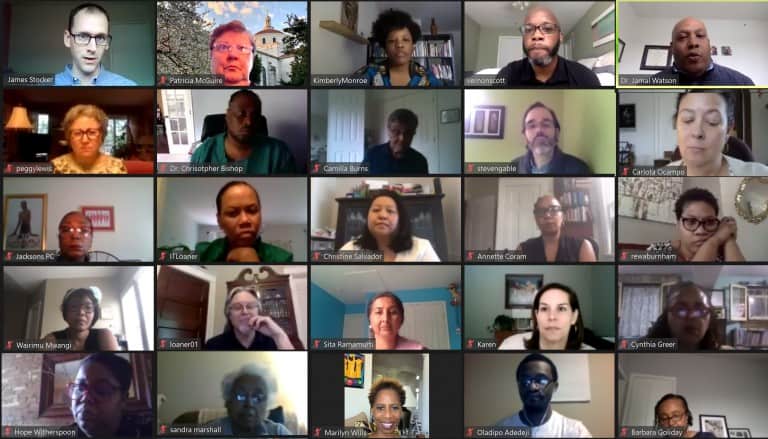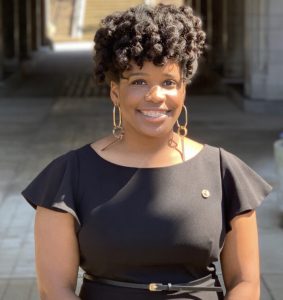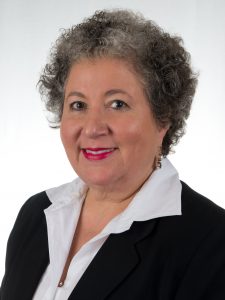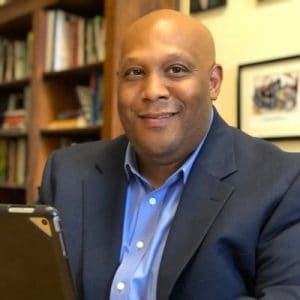
Voices of Trinity: Faculty Speak on Black Lives Matter

On July 16 Trinity students, faculty and staff gathered for our first campus conversation about Black Lives Matter and what we must do as a university community to address and defeat systemic racism wherever it exists. Organized by Dr. James Stocker, the Executive Director of the Trinity Global Leadership Initiative, the discussion started with reflections by Dr. Kimberly Monroe of Global Affairs, Dr. Jamal Watson of the Strategic Communication and Public Relations Program, Dean Peggy Lewis, Dr. Christopher Bishop of Psychology, and Mr. Vernon Scott of Criminal Justice. Below are some of their reflections. During the discussion many participants recommended further readings, and we are compiling a bibliography and will publish a recommended reading list later this week.
Mr. Vernon Scott, Assistant Professor and Chair, Criminal Justice
 If we are truly interested in fixing the problem, as opposed to merely fixing the blame, we have to address this issue on a much wider scale. Unethical law enforcement practices is merely a by-product of the much larger issue at hand. The driving force behind unethical law enforcement practices is the same force that’s driving healthcare inequalities, educational inequalities, redlining, and disparities in opportunities. We are at a pinnacle point in time; where everyone is finally focusing on this issue at the same time. If we are truly interested in effectuating change, we need to seize this moment, and have those discussions that make us uncomfortable.
If we are truly interested in fixing the problem, as opposed to merely fixing the blame, we have to address this issue on a much wider scale. Unethical law enforcement practices is merely a by-product of the much larger issue at hand. The driving force behind unethical law enforcement practices is the same force that’s driving healthcare inequalities, educational inequalities, redlining, and disparities in opportunities. We are at a pinnacle point in time; where everyone is finally focusing on this issue at the same time. If we are truly interested in effectuating change, we need to seize this moment, and have those discussions that make us uncomfortable.
Dr. Kimberly Monroe, Assistant Professor of Global Affairs
 Assata Shakur said, “Nobody is going to give you the education you need to overthrow them, or teach you your true history if they know that that knowledge will help set you free.” I reflect on Shakur’s words as a professor and I’m reminded of my time as a senior in college when Trayvon Martin was slain at the hands of George Zimmerman. I wanted to hear from my professors, I wanted them to teach us more of our history. When that didn’t happen I knew that I had to seek knowledge elsewhere. For those reasons and more I became a professor and I’m constantly thinking of the obligation and duty I have, to ensure my students understand and can articulate the dismantling of white supremacy and racism throughout the world.
Assata Shakur said, “Nobody is going to give you the education you need to overthrow them, or teach you your true history if they know that that knowledge will help set you free.” I reflect on Shakur’s words as a professor and I’m reminded of my time as a senior in college when Trayvon Martin was slain at the hands of George Zimmerman. I wanted to hear from my professors, I wanted them to teach us more of our history. When that didn’t happen I knew that I had to seek knowledge elsewhere. For those reasons and more I became a professor and I’m constantly thinking of the obligation and duty I have, to ensure my students understand and can articulate the dismantling of white supremacy and racism throughout the world.
My role as a professor of history is to teach students about the global resistance of Black/African people. From the continent of Africa fighting against colonialism, the slave revolts on the ships that sailed across the Atlantic, and in North America when Nat Turner strategically organized an uprising in Virginia, history has proven that we fought back and we survived.
This moment of oppression and racism is not new, it is one that Black Americans and the global African community have faced for over 400 years since the first African was taken from Angola and brought to North America. It is a struggle, but I believe that we will win. Fannie Lou Hamer said, ‘Nobody’s free until everybody’s free” and her words reign heavily today as people from all social classes and races envision a world where Black Lives Matter.
Book Suggestions:
Assata: An Autobiography
Blood In My Eye by George Jackson
The Autobiography of Angela Davis
Yurugu by Marimba Ani
The Afrikan Holocaust by John Henrik Clarke
A Taste of Power by Elaine Brown
The War Before by Safiya Bukhari
Revolutionary Suicide by Huey P. Newton
Ready for the Revolution by Stokely Carmichael
Dr. Christopher Bishop, Associate Professor of Psychology
 Intergenerational trauma has impacted the African American community since we arrived in America. This ongoing trauma is a psychological warfare on the community. Historically, police brutality on the African American community is not an isolated incident, but a directive based on institutional racism in law enforcement. This discrimination leads to complex trauma where African Americans are consistently victimized by police brutality, white supremacy, healthy inequality, and other forms of discrimination and segregation that are designed to oppress the black community. It is important that African Americans are provided a safe space to heal and find coping strategies to manage in these tumultuous times.
Intergenerational trauma has impacted the African American community since we arrived in America. This ongoing trauma is a psychological warfare on the community. Historically, police brutality on the African American community is not an isolated incident, but a directive based on institutional racism in law enforcement. This discrimination leads to complex trauma where African Americans are consistently victimized by police brutality, white supremacy, healthy inequality, and other forms of discrimination and segregation that are designed to oppress the black community. It is important that African Americans are provided a safe space to heal and find coping strategies to manage in these tumultuous times.
Dr. Peggy Lewis ’77, Dean of the School of Professional and Graduate Studies
 Rayshard Brooks
Rayshard Brooks
George Floyd
Ahmaud Arbery
Breonna Taylor
Sandra Bland
Walter Scott
Philando Castile
12 year old Tamir Rice
I should not have those names and what happened to them seared in my memory….but I do…a lot of us do…
These past few weeks I pivot between anger, sadness, crying…back to anger…and sadness…I think I land most often on numbness…but I know I can’t give way to anger and bitterness
I almost declined to participate in this conversation…because I am tired of talk…I am tired of the news….and the news analysis and the political pundits…and what can I say that has not already been said…but I think conversations are important and I know education is powerful…and I know I will learn something listening to my colleagues
But the reality of that we are living in a pandemic of racism in the middle of a health pandemic which are both disproportionately killing Black folk…is to live in a daily nightmare…we are afraid to turn on the news for fear of yet another policeman killing another Black man…and yet it keeps happening…
As Malcolm X said in 1964: “We don’t see any American Dream…We’ve experienced only the American nightmare.”
And as Dr. Ibrim Kendi has written “What one Black American experiences, many Black Americans experience. Black Americans are constantly stepping into the toil and terror and trauma of other Black Americans. Black Americans are constantly stepping into the souls of the dead. Because they know: They could have been them; they are them. Because they know it is dangerous to be Black in America, because racist Americans see Blacks as dangerous.”
We can thank decades of American media for that….in advertising…in news…in shows and film…we contend with countless images of Black men as criminals instead of as loving fathers and husbands and brothers…
When I was a television reporter in Miami back in the 80’s— I covered riots that were the result of police shooting unarmed Black men….and corruption in the department that included so much abuse of power…we could just exchange those pictures and soundbites for today’s pictures and soundbites…those community leaders and activists…for today’s…because we are seeing the same kind of abuse and asking the same questions, and seeing some of the same responses only now….we have the advantage of cell phones and social media bringing more of these cases to our attention…
And once again we have a movement calling for change…calling for equal justice and an end to police misconduct and laments about racism…if news is the first page of history – then history repeating itself will result in us doing the same thing 20 years from now…
I recently reread Martin Luther King Junior’s “Letter from a Birmingham Jail” to try to gain some perspective, and I have to tell you after reading what Dr. King wrote in April 1963, I was saddened by how little progress we have made. So much of American history is tied to race. The Civil War, Reconstruction, Jim Crow segregation, laws mandating desegregation, the school-to-prison pipeline…the criminalization of children’s behavior… mass incarceration, voter suppression, housing discrimination, banking redlining, Colin Kaepernick taking a knee, removing Confederate Statues and flags…. It all points to America’s pandemic of racism…
What Dr. King wrote in his letter in 1963 is so hauntingly applicable today:
Lamentably, it is an historical fact that privileged groups seldom give up their privileges voluntarily. Individuals may see the moral light and voluntarily give up their unjust posture; but, as Reinhold Niebuhr (Knee-bur) has reminded us, groups tend to be more immoral than individuals.
We know from painful experience that freedom is never voluntarily given by the oppressors; it must be demanded by the oppressed.
…You may well ask, “Why direct action, why sit-ins, marches, and so forth? Isn’t negotiation a better path?” You are exactly right in your call for negotiation. Indeed, this is the purpose of direct action. Nonviolent direct action seeks to create such a crisis and establish such creative tension that a community that has consistently refused to negotiate is forced to confront the issue. It seeks so to dramatize the issue that it can no longer be ignored.
…You deplore the demonstrations taking place in Birmingham. But your statement, I am sorry to say, fails to express a similar concern for the conditions that brought about the demonstrations.
As Dr. King said then, “…we have waited more than 340 years for our constitutional and God-given rights.” And in 2020 we are still waiting.
Change in America never comes about without violence…yes you can have peaceful nonviolent demonstrations as Dr. King advocated…but Malcolm X also said “By any means necessary”….it is not until there are flames and an economic impact that we see political change…
But three things give me hope—Young People; Education about the Black Experience; and faith….
These young people in the streets including our students….the demonstrations across the nation and around the world in the name of justice for George Floyd….
They are a multicultural, multinational, storm flooding the streets demanding change…they are all races, ages and genders…they get it and they’re fired up.
The second thing I think is hopeful, is that books on the Black experience are flying off the shelves…Black authors and Artists are being given platforms to speak in all types of media…maybe our K-12 textbooks will finally change…
We are hearing from and reading:
Bryan Stevenson’s Just Mercy
Michelle Alexander’s The New Jim Crow
John Lewis’ Walking with the Wind
And people can watch for free Ava Duvernay’s amazing film works:
13th, Selma, and When They See Us
And finally…the third thing that gives me hope—is faith…I am a follower of Jesus…and this morning I listened to Reverend Berniece King, Dr. King’s daughter….and she reminds us that we are called to love one another….and that we cannot let the injustice make us injust…she quoted Micah 6:8:
“What doth the Lord require of thee, but to do justly, and love mercy, and to walk humbly with thy God.” Then she said: “We have to learn how to love each other through our differences! Social Justice needs to be aligned with the Word of God…”
Do good to them that hate you is hard to swallow but that is why I look to Jesus….In the end I have faith….. and that will get me through this ongoing nightmare.
Dr. Jamal Watson, Program Director and Assistant Professor of Strategic Communications and Public Relations
 It is appropriate that this event is sponsored by the Trinity Global Leadership Initiative. Indeed, the response to George Floyd’s death has been global. From London to Paris to Hong Kong, protestors have taken to the streets to demand justice.
It is appropriate that this event is sponsored by the Trinity Global Leadership Initiative. Indeed, the response to George Floyd’s death has been global. From London to Paris to Hong Kong, protestors have taken to the streets to demand justice.
This summer, I am teaching a course called “Race, Gender, Class in the Media.” My graduate students are interrogating issues of white supremacy and racism in the media. They are drawing on theoretical frameworks to understand the protests in the streets. They are studying historiography to understand how the civil rights movement in particular, dramatized racial injustice in the 1950s and 1960s and changed America for the better.
Today, I leave you with three suggestions.
- We must know our history. We have to understand the intersectionality of social movements. As we fight against racism, we must also address economic disenfranchisement and sexism.
- We must actively acknowledge our implicit biases. We must address systemic racism. Many of us have learned what not to say in public; but we must also acknowledge our biased private thoughts.
- We must work toward being an antiracist. As Dr. Ibram X. Kendi has said: “It is not enough to not be racist. We have to be antiracist.”
While we can’t necessarily dictate how others act, we can work toward educating ourselves and in doing so, help to create a “Beloved Community.” In order to do that, I recommend several books:
Tears We Cannot Stop: A Sermon to White America by Michael Eric Dyson
How to Be an Anti-Racist by Ibram X. Kendi
The Sword and The Shield by Peniel E. Joseph
My Vanishing Country: A Memoir, by Bakari Sellers.
Finally, solving the issue of racism can’t be placed exclusively on Black people. That’s a burden too great for Blacks to bear alone.
As Toni Morrison remarked to Charlie Rose in a 1993 interview when she was asked by Rose how she responds to everyday racist encounters. She said:
“Let me tell you, that’s the wrong question. Don’t you understand, that the people who do this thing, who practice racism, are bereft. There is something distorted about the psyche. If you can only be tall because somebody is on their knees, then you have a serious problem. My feeling is that white people have a very, very serious problem. And they should start thinking about what they can do about it. Take me out of it.”
Dr. James Stocker, Executive Director, Trinity Global Leadership Initiative and Associate Professor, International Affairs
 How do we recognize key turning points in history? In some cases, these don’t become obvious for many years, even decades, but in others, you know it as soon as it happens. I think the current moment is in the latter category. There’s no denying that there is something different about the Black Lives Matter protests sparked by the killing of George Floyd on May 25.
How do we recognize key turning points in history? In some cases, these don’t become obvious for many years, even decades, but in others, you know it as soon as it happens. I think the current moment is in the latter category. There’s no denying that there is something different about the Black Lives Matter protests sparked by the killing of George Floyd on May 25.
These demonstrations did not just spring out of nowhere. The Black Lives Matter movement took off in 2013 after the killing of Trayvon Martin by George Zimmerman. In one sense, it is part of a larger African American struggle for equality in our country, but in another sense, it is a reaction to those earlier movements. While the civil rights movements of the 1950s onwards succeeded in gaining legal equality for black Americans, they did not fully break down larger barriers to equality that still exist today. You know the statistics:
- A black person is roughly three times more likely to be killed by police than a white person.[1]
- The average wealth of a white family in America is ten times that of black families.[2]
- There are discrepancies beyond just security and economics: in education[3], life expectancy[4], neonatal mortality[5], and just about every other area of life.
- While these discrepancies also affect other Persons of Color, the gaps for Black Americans are generally even greater.
Given that this situation has persisted for so long, why was it Mr. Floyd’s death that sparked these protests? It’s difficult to disambiguate the causes.
In part, the protests were the public reaction to a long series of well documented public killings of African American men by police. The increased use of body cameras has produced indisputable video footage that proves what many (particularly white people) doubted.
The protests may also in part reflect national frustration over COVID-19. The pandemic has left many out of work, increasing social tensions. It has left many people with more time than ever to focus on social issues. And it has disproportionately affected African Americans.
Finally, the protests no doubt reflect growing dissatisfaction with a presidential administration that has failed to lead by any reasonable definition of the term leadership.
The task for us today is to try to make sense of what this movement means, for the country, the DC area, and particularly for Trinity. President McGuire has done a great service by collecting our community’s stories for her blog. This event serves as a continuation of such efforts to facilitate an earnest conversation in our community about these issue.
We have five outstanding faculty members here to help us start the discussion. Many of them have spoken publicly about this issue. However, this would not be a complete discussion without our students, so I have asked my colleagues to limit their comments to 7-8 minutes so that we can have student participation.
As we conduct our discussion, I’d like us to be particularly mindful of our focus on Trinity: What can we at Trinity do to help advance this issue nationally? How can we help our students voices to be heard? Do our students feel like their voices are being heard here on campus? These are just a few topics that we could fruitfully address here.
[1] https://www.bostonglobe.com/2020/06/11/opinion/statistical-paradox-police-killings/
[2] https://www.brookings.edu/blog/up-front/2020/02/27/examining-the-black-white-wealth-gap/
[3] On the White-Black gap in education, see https://nces.ed.gov/pubs2019/2019038.pdf, esp. iv.
[4] https://www.ncbi.nlm.nih.gov/pmc/articles/PMC4984780/
[5] https://www.americanprogress.org/issues/early-childhood/reports/2018/02/01/445576/exploring-african-americans-high-maternal-infant-death-rates/
RECOMMENDED BIBLIOGRAPHY
Trinity faculty, staff, and students recommended these titles and films during the Black Lives Matter discussion. We are asking everyone in the Trinity community to select 2-3 for reading this summer, and to write reflections for submission to this blog (send to president@trinitydc.edu for posting) and as the basis for ongoing discussions in the fall semester. Thanks to Librarian Bridgette Comanda for including links to e-books and sources for the texts:
Books
Stacey Abrams, Our Time Is Now: Power, Purpose, and the Fight for a Fair America, MacMillan, 2020. eBook @ DCPL
Na’im Akbar, Breaking the Chains of Psychological Slavery, Mind Productions & Associates, 1996.
Michelle Alexander, The New Jim Crow: Mass Incarceration in the Age of Colorblindness, The New Press, 2012.
Trinity eBook on OverDrive | at Trinity Library | eBook @ DCPL
Marimbi Ani, Yurugu: An African-Centered Critique of European Cultural Thought and Behavior, 1994.
Harry Belafonte, My Song: A Memoir of Art, Race, and Defiance, Vintage, 2012. eBook @ DCPL
James Baldwin, The Fire Next Time, Vintage. Reissue edition, 1992. Trinity eBook on OverDrive | at Trinity Library | eBook @ DCPL
Asha Bandele and Patrisse Cullors, When They Call You a Terrorist: A Black Lives Matter Memoir, McMillan, 2019. Trinity eBook on OverDrive | eBook @ DCPL
Douglas A. Blackmon, Slavery by Another Name: The Re-Enslavement of Black Americans from the Civil War to World War II, Doubleday, 2008. At Trinity Library | eBook @ DCPL
Anthony T. Browder, From the Browder File: 22 Essays on the African American Experience, Institute of Karmic Guidance, 10th edition, 1989.
Paul Butler, Chokehold: Policing Black Men, The New Press, 2018. eBook @ DCPL
Huey P. Newton, Revolutionary Suicide, Scribner, 2005.
John Henrik Clarke, Christopher Columbus and the African Holocaust: Slavery and the Rise of European Capitalism, A & B Book Distribution Inc., 1992.
Ta-Nehisi Coates, “The Case for Reparations”, The Atlantic, 2014, available at https://www.theatlantic.com/magazine/archive/2014/06/the-case-for-reparations/361631/.
Ta-Nehisi Coates, The Water Dancer, One World, 2019. At Trinity Library | eBook @ DCPL
Robin DiAngelo, White Fragility: Why It’s So Hard for White People to Talk About Racism, Beacon Press, 2018. Trinity eBook on OverDrive | eBook @ DCPL
W.E.B. DuBois, The Souls of Black Folk, available at https://www.gutenberg.org/files/408/408-h/408-h.htm. Trinity eBook on OverDrive | at Trinity Library | eBook @ DCPL
Mary L. Dudziak, Cold War Civil Rights: Race and the Image of American Democracy, Princeton University Press, 2011. . At Trinity Library
Michael Eric Dyson, Tears We Cannot Stop: A Sermon to White America, St. Martin’s Press, 2017. eBook @ DCPL
Reni Eddo-Lodge, Why I’m no longer talking to White People about Race, Bloomsbury Adult, 2019. Trinity eBook on OverDrive | eBook @ DCPL
Archbishop Wilton D. Gregory et. al., “Building Bridges of Understanding and Hope: A Letter on Racial Justice from the Catholic Bishops of Maryland”, June 15, 2020, available at https://adw.org/news/marylands-catholic-bishops-issue-letter-on-racial-justice/.
Helen Fox, When Race Breaks Out: Conversations About Race and Racism in College Classrooms, Peter Lang, 2009.
Paulo Freire, Pedagogy of the Oppressed, 30th Anniversary edition, Continuum, 2000. At Trinity Library
Henry Louis Gates, Jr., Stony the Road: Reconstruction, White Supremacy, and the Rise of Jim Crow, Penguin Press, 2019. eBook @ DCPL
Janet E. Helms, A Race is a Nice Thing to Have: A Guide to Being a White Person or Understanding the White Persons in Your Life, Content Communications, 1992.
Asa Hillaird, The Maroon Within Us: Selected Essays on African American Community Socialization, Black Classic Press, 1994.
George Jackson, Blood in my Eye, Black Classic Press, Reprint edition, 1996.
Bettina Love, We Want to Do More Than Survive: Abolitionist Teaching and the Pursuit of Educational Freedom, Beacon Press, 2020. eBook @ DCPL
Peniel E. Joseph, The Sword and the Shield: The Revolutionary Lives of Malcolm X and Martin Luther King, Jr., Basic Books, 2020. eBook @ DCPL
Ibram X. Kendi, Stamped From the Beginning, Bold Type Books, 2017. Trinity eBook on OverDrive | free audiobook on Spotify | eBook @ DCPL
Ibram X. Kendi, How to be an Anti-Racist, Penguin, 2019. Trinity eBook on OverDrive | at Trinity Library | eBook @ DCPL
John Lewis, Walking with Wind: A Memoir of the Movement, Simon and Schuster, 2015. At Trinity Library
Helen A. Neville, Miguel E. Gallardo, and Derald Wing Sue (eds.), The Myth of Racial Color Blindness: Manifestations, Dynamics, and Impact, American Psychological Association, 2017.
Trevor Noah, Born a Crime: Stories from a South African Childhood, One World, 2019. Trinity eBook in OverDrive | eBook @ DCPL
Bakari Seller, My Vanishing Country, Penguin, 2020.
Assata Shakur and Angela Davis, Assata: An Autobiography, Lawrence Hill Books, 2001. Trinity eBook in OverDrive | at Trinity Library | eBook @ DCPL
Ivan Van Sertima. They came before Columbus: The African Presence in Ancient America. Random House, 2003.
Dorothy Sterling, Black Foremothers, Second edition, The Feminist Press at CUNY, 1993.
Bryan Stevenson, Just Mercy: A Story of Justice and Redemption, One World, 2015. At Trinity Library | eBook @ DCPL
Beverly Daniel Tatum, Why are all the Black Kids Sitting Together in the Cafeteria, Revised Edition, Basic Books, 2017. At Trinity Library | eBook @ DCPL
Harriet A. Washington, Medical Apartheid : The Dark History of Medical Experimentation on Black Americans from Colonial Times to the Present, Anchor, 2008. Trinity eBook in OverDrive | at Trinity Library | eBook @ DCPL
Frances Cress Welsing, The Isis Papers: The Keys to the Colors, Third World Press, 1991.
Carter G. Woodson, The Mis-Education of the Negro, 1933. eBook @ DCPL
Chancellor Williams, The Destruction of Black Civilization: Great Issues of a Race from 4500 B.C. to 2000 A.D., Third Edition, Third World Press, 1992.
Video
Netflix: Black Lives Matter collection, available at https://www.netflix.com/browse/genre/81299227?so=su.
Ava DuVernay, When They See Us, Netflix, 2019, available at https://www.netflix.com/title/80200549.